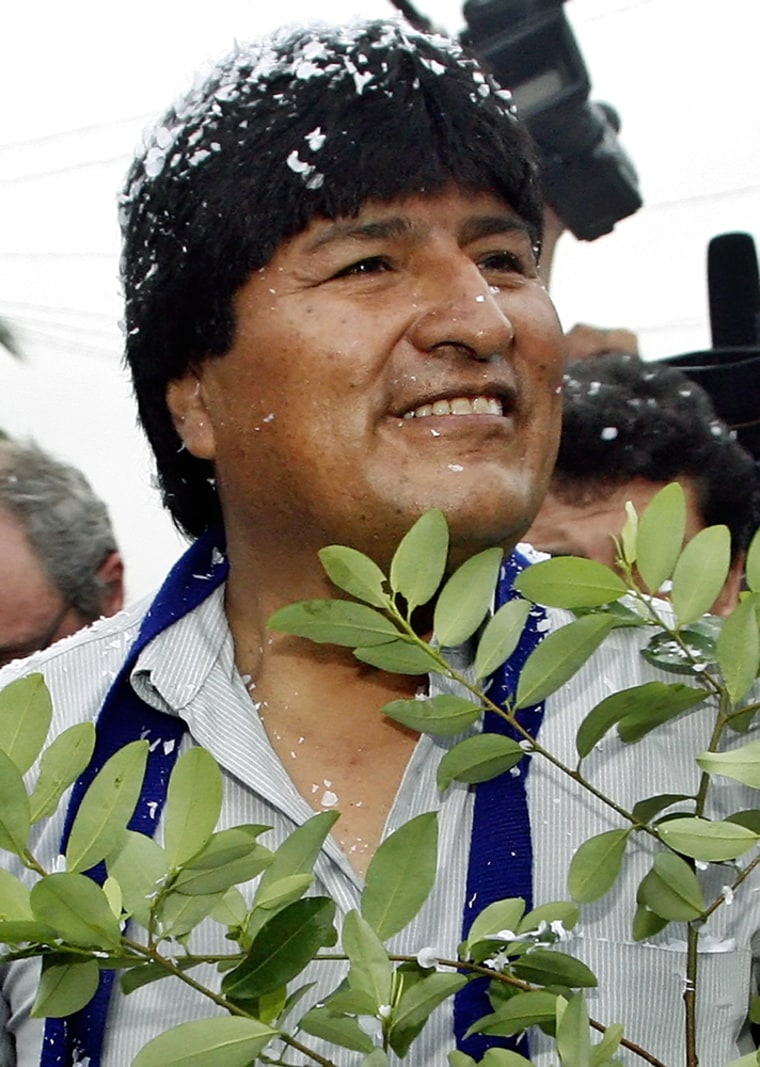Bolivia's presidential front-runner said Tuesday he would not allow unlimited production of coca, the crop used to produce cocaine, but would call a referendum to ask how it should be controlled.
"There won't be the free cultivation of the coca leaf," Evo Morales said at news conference, where he also called on the U.S. government to enter into an agreement to "truly" fight drug trafficking.
Morales, a leftist coca grower who campaigned against a U.S.-backed coca eradication effort, gave few details about what voters would be asked to decide, but said, "It's important to listen to the people."

The government currently restricts coca production and has tried to carry out an aggressive, U.S.-funded effort to limit the crop.
He said the referendum would be carried out in coca-growing areas among growers known as "cocaleros."
He said his drug policy will be "zero cocaine and zero drug trafficking, but not zero coca or zero cocaleros," Morales said.
Morales, 46, also said the government would study whether to increase the amount of coca legally grown for traditional consumption.
Current laws permit coca cultivation in 29,000 acres of the Yungas valley and a small amount in the Chapare region.
For thousands of years, people in the Andes have chewed coca to stave off hunger, made it into tea or used it as medicine.
Most is grown on small family plots.
A clear majority for Morales
With 30 percent of the vote counted from Sunday's election, Morales had 48 percent, while conservative rival Jorge Quiroga had 35 percent, according to the National Electoral Court. Quiroga has conceded defeat.
Three independent vote counts sponsored by Bolivian news media showed Morales at or above the clear majority he would need to win outright.
If he falls short, Bolivia's congress would decide the winner, but comments Tuesday from the current administration of President Eduardo Rodriguez indicated officials consider the issue settled.
Raucous celebrations erupted among Morales’ supporters after the nationally televised exit polls showed him with a decisive lead over Quiroga, a former president who was backed by Bolivia’s business elite.
Morales thanked a cheering crowd for what he called his “great triumph,” but tempered that by saying he would await official results confirming the outcome.
“I am very content, very emotional about this,” he said.
Friend of Castro and Chavez
Morales counts Cuba’s Fidel Castro and Venezuela’s Hugo Chavez among his friends, along with leftists in Brazil, Argentina and Uruguay who have gained power at the ballot box this decade. After the exit polls were released, an AP reporter at Morales’ home in Cochabamba said he immediately received a phone call from Chavez.
The Aymara Indian street activist on Sunday also referred to his status as a symbol for many of Bolivia’s long-downtrodden Indians, a majority in this country of 8.5 million people.
“I am the candidate of those despised in Bolivian history, the candidate of the most disdained, discriminated against,” he said after working through a crowd of admirers — some of whom rushed forward to kiss him — before voting at a decrepit basketball court in the village school.
Eduardo Gamarra, a Bolivian political expert, said Morales’ bid to become the latest South American leftist to win election was fueled by support that went undetected in pre-election projections. Many Indians blame the country’s free-market policies for enriching white elite at the expense of the majority poor.
“I think there were people who didn’t want to say openly that they wanted to vote for Evo Morales,” said Gamarra, head of the Latin American studies department at Florida International University.
